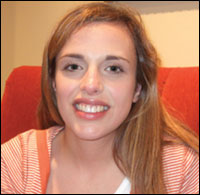
Am Fam Physician. 2008;78(2):203
I was diagnosed with leukemia when I was seven. I remember the very day I was diagnosed; my arms and legs wouldn't move right. But, I have selective memory about the rest. I know I was only in the hospital for 11 days after my diagnosis, and I missed two months of second grade. One of my hospital roommates had a different kind of cancer and she died one or two years later. I had chemotherapy for two years and then follow-up appointments for a long time. But, I had my last visit to the children's hospital at age 17 or 18, and now I'm 31. So it hasn't really been a part of my life for a long time.

I'm not sure what effect having childhood cancer has had on me. It is not something I tell friends about, and I don't really feel like a cancer survivor. I only started thinking more about my medical history when I was pregnant. Would my daughter be affected? Would any of my treatments affect my health during the pregnancy? My daughter is perfectly healthy, and I know acute lymphoblastic leukemia is not hereditary, but I admit that I do wonder occasionally if it could ever come back. I think my family worries about that more than I do. We got my treatment records so we can review the chemotherapy drugs to see if I need to do anything differently in terms of screening tests, and what my future cancer risks may be.
Although, in general, I like to think I've left this experience behind me, the most important life lesson I still carry is that a strong family can be a godsend. My parents, who had gotten divorced when I was three, started working together to help me during my illness, and they still have a cordial relationship today. That may not have happened if I hadn't gotten sick.—d.b., 31
COMMENTARY
Although adult survivors of childhood cancers are growing in number, they still comprise a very small percentage of family medicine patients. Many of these patients face increased risk of other cancers and morbidities, mainly from the chemotherapy or radiation therapy they received years earlier. A recent article confirmed these findings, noting that women have a higher risk than men, and survivors of acute leukemias have a higher risk than survivors of other cancer types.1 Neither patients nor physicians may be aware of these increased risks. The first step is to encourage patients to get copies of their treatment records so that the actual doses of chemotherapy and radiation can be assessed. Survivor clinics for adults operate in some pediatric cancer centers; health care professionals at these clinics can comprehensively review a patient's past therapies and suggest a risk-based screening regimen.